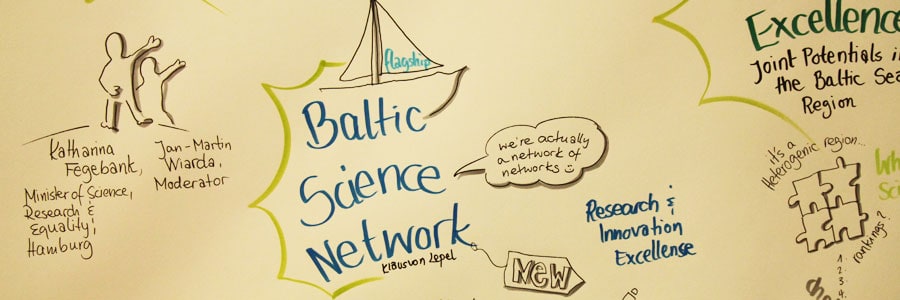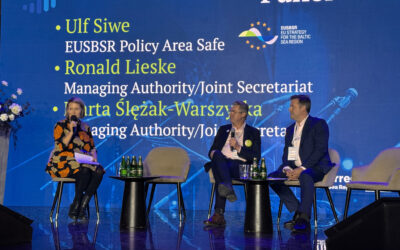The Baltic Science Network shapes not only policies, but, most importantly, it develops perceptions about the value and importance of cooperation in higher education, research and science domains. Baltic Science Network started as the Interreg Baltic Sea Region project BSN in March 2016 and will continue as BSN_powerhouse until January 2021.

© CBSS/ Visual Facilitators Katrin Faensen
Performance gap in Baltic Sea region science and research
Science and innovation are essential for Europe´s future. The Baltic Science Network (BSN) – actively strengthens the European Research Area (ERA). ERA was created to establish a genuine single research and innovation area that guarantees freedom of movement for researchers and free exchange of scientific knowledge and technologies. BSN efforts are directed towards improving the research potential of the Member States from the Baltic Sea region, i.e. Estonia, Latvia, Lithuania and Poland which joined the EU in 2004 (also referred to as EU-13) to meet the performance levels of the older Member States (also referred to as EU-15). Estonia serves as an inspiring example that such a goal is achievable.
Taking all actors on-board
An excellent science is an internationally competitive science. BSN addressed the challenge of closing a performance gap between the EU Member States. This requires multilateral commitment and transnational efforts in capacity building. For this reason, BSN assembles various actors, such as transnational networks (Baltic University Programme, Baltic Sea Region University Network), regional and national ministries, agencies and universities in order to coordinate efforts that foster science and research in the macro-region.
To hone its focus and prove in a longer-term perspective its added value, BSN selected three areas of common interest: photon and neutron science, life sciences and welfare state. Consequently, independent experts from the three selected fields offered their recommendations and suggestions to BSN on what activities, thematic strands and data repositories should be prioritised in order to further support scientific excellence and research competitiveness of the Baltic Sea region. For example, the BSN received a suggestion from independent experts specialised in welfare state studies to ensure the international research community with free and open access to high-quality, comparative survey data.
Influencing policies to get better results on the ground
With full appreciation of the logic that every Euro invested in knowledge, research and innovation is an investment in Europe´s future, BSN prepares researcher mobility tools to minimise the risks of brain drain from less preforming parts of ERA and move towards more active brain circulation. The project offers new networking opportunities via such enablers as summer schools, research internships and short-term scholarships. “Such mobility tools are important, as they encourage young researchers to start building their networks here in the Baltic Sea region. This can have a big impact not only in their researcher careers, but also in the research networks in the whole Baltic Sea region”, says Riitta Mustonen, Director of Development of the University of Turku.
BSN thoroughly discussed and reached some common grounds on what causes the disparities in the ERA. For example, BSN commissioned an analysis which showed that “the islands of excellence in” Latvia, Lithuania and Poland “are too few and too small to deliver the same number of excellent proposals and projects as centres of excellence in the leading EU regions”. BSN also acknowledged that certain measures, such as structured under the term “widening participation” still require some time to prove their full potential. The BSN Position Paper “Tackling widening participation in R&I from the Baltic Sea Region perspective” has reached key decision makers on the national and EU level, amongst others Carlos Moedas, European Commissioner for Research, Science and Innovation. The joint letter presented by Katharina Fegebank, Second Mayor and Senator for Science, Research and Equalities of the Free and Hanseatic City of Hamburg, and Mailis Reps, Estonian Minister of Education and Research, received an overall Commissioner´s appraisal of BSN´s supported cooperation among EU Member States located in the Baltic Sea region. Thus, the BSN proposals for widening measures do not remain within the confines of the Baltic Sea region; they resonate among the key EU decision-makers instead.
Thus, BSN has achieved not only a mere technical delivery of national and institutional action plans for forthcoming cooperation among entities based in the macro-region with a focus on photon & neutron science, life sciences and welfare state. It also attempts to shape the way how collaboration in higher education, research and science within the Baltic Sea region is perceived by the decision makers at the EU level. Namely, the BSN Policy Paper Regarding the EU Framework Programme 9 outlines the untapped research and innovation potential across the Baltic Sea region. This resourceful document encourages Horizon Europe, the future EU Framework Programme for Research and Innovation, to be tailored as an open and inclusive programme which welcomes new approaches and participants.
Science and research in a macro-regional context
A change of the mind-set is a tacit, yet highly valuable contribution not only for the mere sake of successful future implementation of the BSN action plans. It also facilitates the potential emergence of an epistemic community with high potential to advance the implementation of the EU Strategy for the Baltic Sea Region (EUSBSR) and the ERA. By offering additional support to the pockets of excellence in the EU-13, BSN contributes to increasing territorial cohesion and reinforcing a strong sense of shared interests. Anders Bergström, Coordinator of the Policy Area Education, Research and Employability of the EUSBSR, highlights: “BSN is a good example how the EUSBSR meets the need of a more integrated Europe where societal and ecological challenges are addressed across borders, integrating various policy sector’s and taking multilevel governance as a guiding principle.”






